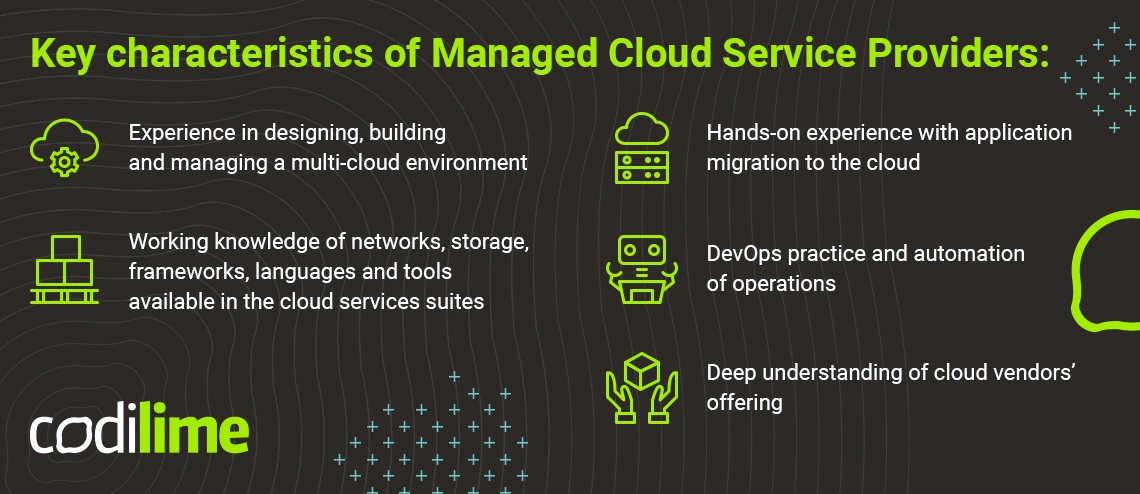According to Forrester data , 2019 will be the year when companies begin moving their core apps and operations into the cloud. As many companies have already seen, there are numerous benefits of cloud transformation and multiple vendors to choose from. According to RightScale, a full 91% of companies already use public cloud, 72% have used a private cloud and 58% of companies employ a multi-cloud strategy.
With 91% of the organizations surveyed by CompTIA using some form of cloud computing, it is safe to say that companies are getting more and more cloud-reliant. In cloud’s simplest form, companies can harness the services in a Software as a Service (SaaS) model, which are popular when purchasing online productivity and a collaboration suite or shared disks.
However, a company applying a bunch of SaaS solutions is one thing, but leveraging the real power of cloud infrastructure is quite another. And the transformation itself is only the beginning - 84% of companies consider managing cloud costs and cloud governance as key challenges of 2019.
And that’s where providers of managed cloud computing services come in handy.
What a Managed Cloud Service Provider (MCSP) does
Modern business models require resources to be shared and enable customers to access the services quickly, scalably and conveniently. This is why SaaS models have become popular. But it’s not only SAAS that is being widely adopted. According to the RightScale report, up to 38% of workloads are running in public clouds and 41% in private ones. Moreover, 66% of companies already have an internal cloud team .
When it comes to managing the cloud-based services and cherry-picking the right parts of the offer to tailor the optimal solution, there is a huge need for a multi-vendor experience, and for vendors to command deep knowledge from various fields.
That’s basically what managed cloud services providers do.

Thus, it’s no surprise that the market is estimated to grow from $138.27 billion (US) in 2016 to $257.84 billion in 2022 . A good Managed Cloud Service Provider is a guide in the foggy land of cloud computing and provides expertise in designing and delivering the business value gained by tailoring a solution from various offers and possibilities. The partner helps to decide which part of a business should go to the cloud and which should be kept in the on-prem infrastructure. And that may be tricky from both a technical and legal point of view.
Key benefits of managed cloud services
1. Optimized pricing
On-premise infrastructure comes with many costs, including many hidden ones. Some estimations show that cloud-based infrastructure enables the company to save up to 30% of costs. Harnessing the experience of MCSPs results in additional savings by combining the best offers from various providers, while neither wasting power nor overestimating demand.
Moreover, when done in the wrong way, cloud migration may result in significantly increased infrastructure costs. Cloud-based resources are infinite, but the company has to pay for every bit of storage and transfer. Given that, any mistakes in designing the infrastructure will take a serious financial toll. The sum of all mistakes can be an unsettling figure.
Here, you can get more information about our environment services.
2. Cost predictability
Cloud-based resources are highly predictable, with clear pricing policy and no surprises lurking. When paying for cloud-based services, the company has a clear set of conditions to be paid for. These may include the amount of computing power used, the disc space available or the data transfer used. But the devil is in the details - interoperability and the way various services are combined may result in unexpected glitches or non-optimal billing.
When the required computing power or data transfer skyrockets, the company has a choice: pay for additional resources or drop some to save on costs. Thus, the need for control over the costs is much higher than in a traditional model. And better to be left to specialists, especially if you have none on board.
3. Scalability and flexibility
Cloud provides practically an infinite amount of storage and computing power. This makes it easy to leverage the possibilities of cloud to upscale business when needed and downscale after a peak. Whenever the company faces an unexpected spike in demand for computing power, providing additional resources comes in handy.
Considering that, whenever an advertisement campaign is surprisingly successful or a company’s offer is suffering the “reddit effect”, it need not fear a lack of power to meet customers’ needs.
The support of an MCSP makes flexibility much easier to achieve by combining various cloud vendors’ offerings and designing the best offer available.
The pinnacle of cloud’s flexibility is seen in a serverless paradigm for delivering services. This approach makes it possible to design only the logic of an app or service, regardless of the bare metal beneath. With that, the delivery is made simple, with cost optimization and scalability by design.
4. Future-proofing
The tech world is advancing rapidly, with new breakthroughs at a dizzying speed. The big data revolution broke, and the machine learning disruption followed in its wake. Investing in their own infrastructure requires companies today to choose a technology and vendor-locking to it for the upcoming few years. Today’s top-notch hardware easily becomes legacy after a mere few years of usage, with all manner of systems entangled in the system and hard to replace. According to Deloitte, up to 24% of financial companies don’t even consider replacing legacy tech due to the massive problems that attend that process. Cloud transformation is made easier, on the other hand, especially considering the challenges of uplifting and redesigning legacy apps, when one forges cooperation with the right business partner.
With legacy code a time bomb for business, cloud-enabled flexibility may be crucial in building the company that survives.
5. Added services
Cloud is not only based on replacing physical infrastructure and providing computing power on demand. Cloud providers are racing to offer more value added to differentiate themselves and build competitive advantage that benefits users. Additional services cloud offers include:
-
Backup services - cloud providers support their clients with a backup service for data not being used during daily operations. Amazon’s Glacier is one of the most renowned such services.
-
Disaster recovery - the ongoing backup process cloud affords enables companies to quickly recover from disaster, be it a devastating cybercrime attack or simple human error.
-
Redundancy - building virtual infrastructure with computing power and storage enables companies to keep almost infinite redundancy. The ideal-world mirror datacenter, ready to start operations whenever the owner so desires, is a reality for cloud-based companies.
-
Sharing resources - if data is available in the cloud, it is much easier to share it with other platforms and thus build greater value for the companies. That is much more difficult with on-prem infrastructure.
-
Specialized platforms (AI building, business intelligence, collaboration) - cloud providers tailor their offerings for the particular use cases to support their clients’ needs. The best example may be the machine learning revolution, where major players provide clients with their own AI-building platforms. Moreover, Google Cloud Platform offers access to its TPUs, specialized processing units designed to provide the most effective computing power for machine learning applications. For most companies, using a TPU in any other model than an IaaS would be pointless - unlike flexible commodity hardware, TPUs are useless for anything but building AI models.
Read also >> Google Cloud Next highlights
So do you know how to connect and implement them to run smoothly? MCSPs should know.
6. Security
Contrary to common myths, cloud-based infrastructure is more secure than its on-prem counterpart. According to Gartner, through 2022 at least 95% of cloud security failures will be the customer’s fault . Considering that, choosing the right partner to implement a cloud strategy may be key to having one of the most secure hardware configurations ever designed.
Why is the support from a Managed Cloud Service Provider essential
Cloud is not an easy technology to manage and even harder to master. Different clouds are designed to fulfill different business needs.
Moreover, cloud computing augments a variety of technologies used in the organization to support ongoing processes. That is why more and more companies are turning to the providers of the managed cloud services.
According to the RightScale report , many companies intend to significantly change their cloud strategy, including by optimizing cloud spending (64% of respondents), moving more workloads to the cloud (58%), expanding the use of containers (39%) and implementing a cloud-first business strategy.
An experienced managed cloud services provider is one that has not only implemented various types of clouds, both private and public, but one that can also lift and shift existing company apps to the cloud and build new with cloud-native principles. Such a provider can use the full gamut of components available on the market to tailor the best system.









